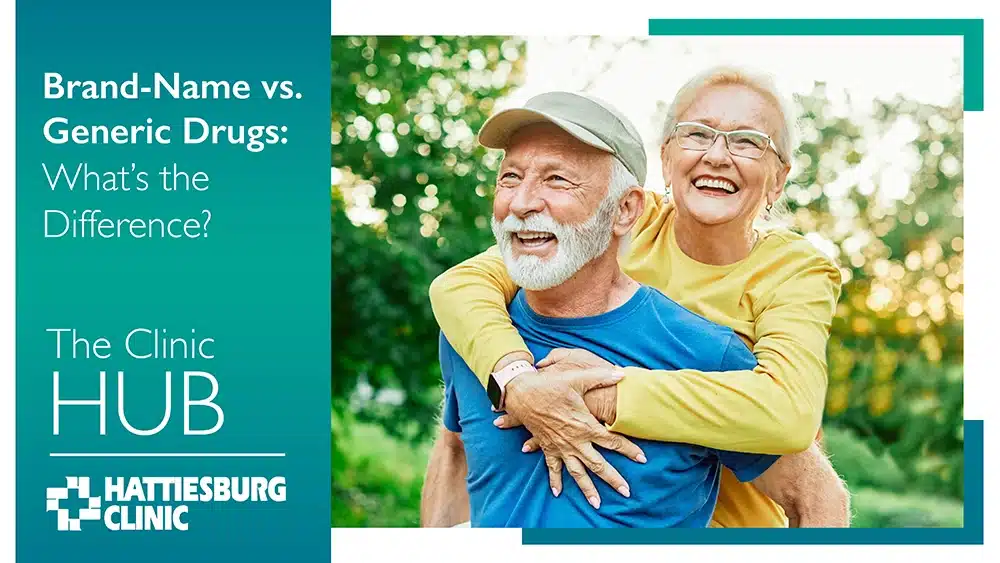Brand-Name vs. Generic Drugs: What’s the Difference?
When you pick up a prescription at the pharmacy, you’re often given a choice between a brand-name drug and its generic equivalent. While the generic option is usually much cheaper, many people wonder if it’s just as effective. In this article, we will break down the key differences between brand-name and generic drugs to help you make informed decisions about your health care.
- What are Brand-Name Drugs?
- What are Generic Drugs?
- Are Generic Drugs As Effective as Brand-Name Drugs?
- Why Are Brand-Name Drugs More Expensive?
- When Should You Choose a Brand-Name Over a Generic?
- Why Choose Hattiesburg Clinic
What are Brand-Name Drugs?
Brand-name drugs are the original medications developed by pharmaceutical companies. Before these drugs reach the market, they go through years of research, development and clinical testing to ensure they are safe and effective. A patent is granted to the drug once a company proves its effectiveness and secures approval from the U.S. Food and Drug Administration (FDA) (or other regulatory agencies globally).
Patents usually last 20 years from the time the drug is discovered, giving the manufacturer exclusive rights to produce and sell the drug. This exclusivity allows the company to recover its research and development costs before competitors enter the market.
A well-known example is Lipitor® (atorvastatin), a medication used to lower cholesterol. When it was under patent, only Pfizer® could produce and sell it under the brand name.
What are Generic Drugs?
Generic drugs are created after the patent for a brand-name drug expires. Other pharmaceutical companies can then manufacture and sell the same medication under its generic name.
However, generic drugs must still meet the same strict FDA standards as the brand-name versions. These regulations ensure that the generic is:
- Pharmaceutically equivalent – It has the same active ingredient, strength, dosage form and route of administration (e.g. tablet, capsule, injection).
- Bioequivalent – It performs the same way in the body, meaning it reaches the bloodstream at nearly the same rate and concentration as the brand-name drug.
- Manufactured under strict quality controls – The FDA inspects generic drug manufacturing facilities to ensure safety and consistency.
Generic manufacturers can sell the drug at a significantly lower price because they do not have to invest in research, clinical trials or heavy marketing. This can sometimes be up to 85% cheaper than the brand-name version.
For example, after Lipitor’s patent expired, generic atorvastatin became available and offered patients a more affordable option for cholesterol management.
Are Generic Drugs As Effective as Brand-Name Drugs?
Yes. The FDA requires that generics work the same way as brand-name drugs. They must have:
- The same active ingredient
- The same strength and dosage
- The same method of administration (e.g., pill, injection)
- The same safety profile
The only potential difference is in the inactive ingredients (fillers, dyes or preservatives), which do not affect the drug’s effectiveness but may cause slight variations in appearance, taste or tolerance in some individuals.
For example, if a person is sensitive to a specific dye or filler, they might experience a mild reaction to the generic version even though the active ingredient remains unchanged. If this happens, a doctor might recommend switching to a different manufacturer’s generic version or sticking with the brand-name drug.
Why Are Brand-Name Drugs More Expensive?
Brand-name drugs are costly because pharmaceutical companies spend years developing new medications, conducting research and undergoing clinical trials. Additionally, they invest heavily in marketing to doctors and consumers. These costs are passed on to consumers through higher prices.
Generic manufacturers, on the other hand, skip these steps and can sell the drug at a lower price.
When Should You Choose a Brand-Name Over a Generic?
While generics are a great option for most people, some situations may call for a brand-name drug:
- If you experience side effects from a generic due to different inactive ingredients
- If your doctor prescribes a brand-name drug for specific medical reasons
- If no generic equivalent is available
However, in most cases, generic drugs are safe, effective and cost-efficient alternatives.
Choosing between a brand-name and a generic drug isn’t just about cost—it’s about confidence in your treatment. The most important thing is to have an open conversation with your doctor or pharmacist. They can help you weigh the benefits and risks of each option and make sure you’re getting the best possible treatment for your condition. Whether you choose generic or brand-name, what matters most is that you’re receiving the care you need to stay healthy.
Why Choose Hattiesburg Clinic
Selecting the right pharmacy is an important part of your overall health. An excellent medical team includes a pharmacy and pharmacist capable of caring for each patient’s specific needs. The pharmacy team at Hattiesburg Clinic Owl Drug Store combines clinical expertise, integrity and compassion to ensure you receive the best care possible. Our pharmacists are committed to providing fast and accurate prescription services, as well as personalized counseling on medications to support your health. In addition to prescriptions, our storefront offers a variety of over-the-counter medications, making Hattiesburg Clinic pharmacy services a one-stop shop for your health and wellness needs.
Patients enjoy our fast and personal service. When you call, instead of working through prompts from a robot, you will speak to a member of our team who can quickly answer your questions. Our staff is dedicated to treating every customer with compassion and care. We strive to make medications more affordable, and with convenient options like our drive-thru, getting the care you need is easier than ever.
Source: www.fda.gov
